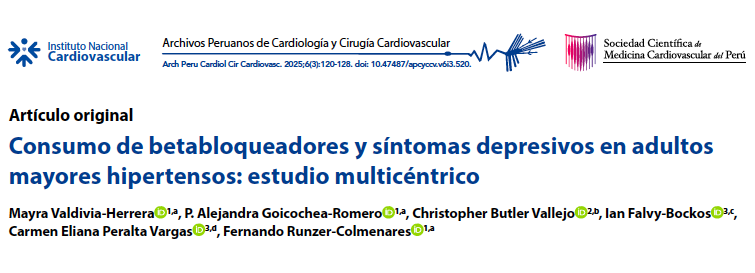Use of beta-blockers and depressive symptoms in hypertensive older adults: a multicenter study
DOI:
https://doi.org/10.47487/apcyccv.v6i3.520Keywords:
Aged, Hypertension, Adrenergic beta-Antagonists, Depression, PeruAbstract
Objectives. To evaluate the association between beta-blocker use and the presence of depressive symptoms in older adults with hypertension (HTN). Materials and Methods. A cross-sectional observational study was conducted among patients from the Central FAP Hospital and the Naval Medical Center. Older adults with a diagnosis of HTN who had been receiving antihypertensive treatment for at least one month were included. Depressive symptoms were assessed using the PHQ-9 questionnaire. Social, clinical, and functional variables were analyzed using bivariate tests (Chi-square and Fisher’s exact test), as well as Poisson regression with robust variance to estimate crude and adjusted prevalence ratios (PR). Results. A total of 149 older adults were included. Of these, 27.5% were taking beta-blockers, and 39% presented depressive symptoms. No significant association was found between beta-blocker use and the presence of depressive symptoms (PR:1.09; 95% CI: 0.70–1.69; p = 0.693). In contrast, a higher risk of depressive symptoms was observed among patients with greater frailty (PR: 5.72; 95% CI: 2.17–15.0; p < 0.001) and a lower risk among those with technical or university education (PR: 0.43; 95% CI: 0.25–0.74; p = 0.003). Conclusions. No association was found between beta-blocker use and depressive symptoms in patients with HTN. Factors such as frailty, educational level, and duration of HTN diagnosis showed significant associations and should be considered in the comprehensive assessment of emotional risk in this population.
Downloads
References
Oliveros E, Patel H, Kyung S, Fugar S, Goldberg A, Madan N, et al. Hypertension in older adults: Assessment, management, and challenges. Clin Cardiol. 2020;43(1):99-107. doi: 10.1002/clc.23292.
Organización Mundial de la Salud (OMS). Hipertensión [Internet]. Ginebra: OMS; 2023 [citado el 5 de septiembre de 2025]. Disponible en: https://www.who.int/es/news-room/fact-sheets/detail/hypertension
Camafort M, Alcocer L, Coca A, Lopez-Lopez JP, López-Jaramillo P, Ponte-Negretti CI, et al. Latin-American Ambulatory Blood Pressure Registry (MAPA-LATAM): An urgent need. Rev Clin Esp. 2021;221(9):547-52. doi: 10.1016/j.rce.2021.03.001.
Instituto Nacional de Estadística e Informática. Perú: Enfermedades No Transmisibles y Transmisibles [Internet]. Lima: INEI; 2022 [citado el 5 de septiembre de 2025]. Disponible en: https://www. gob.pe/institucion/inei/informes-publicaciones/4233635-peruenfermedades-no-transmisibles-y-transmisibles-2022
Gan Q, Yu R, Lian Z, Yuan Y, Li Y, Zheng L. Unraveling the link between hypertension and depression in older adults: a meta-analysis. Front Public Health. 2023;11:1302341. doi: 10.3389/fpubh.2023.1302341.
Organización Mundial de la Salud (OMS). Depresión [Internet]. Ginebra: OMS; 2023 [citado el 5 de septiembre de 2025]. Disponible en: https://www.who.int/es/news-room/fact-sheets/detail/ depression
Chowdhury EK, Berk M, Nelson MR, Wing LMH, Reid CM. Association of depression with mortality in an elderly treated hypertensive population. Int Psychogeriatr. 2019;31(3):371-81doi: 10.1017/ S1041610218002294.
Zhang Y, Chen Y, Ma L. Depression and cardiovascular disease in elderly: Current understanding. J Clin Neurosci. 2018;47:1-5. doi: 10.1016/j.jocn.2017.09.022.
Martina-Chávez M, Hoshi IA, Watanabe SPS, Aguilar RSA, ZeladitaHuaman JA, Parra HC. Depression in elderly in Peru: geospatial distribution and associated factors according to ENDES 2018 - 2020. An Fac Med. 2022;83(3):180-7. doi: 10.15381/anales.v83i3.23074.
Organización Mundial de la Salud (OMS). La carga de los trastornos mentales en la Región de las Américas, 2018. Ginebra: OMS; 2018 [citado el 5 de septiembre de 2025]. Disponible en: https://www. paho.org/es/documentos/la-carga-los-trastornos-mentales-en-laregion-las-americas-2018
Cojocariu SA, Maștaleru A, Sascău RA, Stătescu C, Mitu F, LeonConstantin MM. Neuropsychiatric consequences of lipophilic beta-blockers. Medicina (Kaunas). 2021;57(1):1-13. doi: 10.3390/ medicina57010001.
Boal AH, Smith DJ, McCallum L, Muir S, Touyz RM, Dominiczak AF, et al. Monotherapy with major antihypertensive drug classes and risk of hospital admissions for mood disorders. Hypertension. 2016;68(5):1132-8. doi: 10.1161/HYPERTENSIONAHA.116.07872.
Tao SH, Ren XQ, Zhang LJ, Liu MY. Association between common cardiovascular drugs and depression. Chin Med J (Engl). 2021;134(21):2656-65. doi: 10.1097/CM9.0000000000001644.
Luijendijk HJ, Van Den Berg JF, Hofman A, Tiemeier H, Stricker BHC. β-Blockers and the risk of incident depression in the elderly. J Clin Psychopharmacol. 2011;31(1):45-50. doi: 10.1097/ JCP.0b013e318204a8f9.
Pan American Health Organization. Atención integrada para las personas mayores (ICOPE): guía sobre la evaluación y los esquemas de atención centrados en la persona en la atención primaria de salud [Internet]. Washington, DC: PAHO; 2020 [citado el 5 de septiembre de 2025]. Disponible en: https://iris.paho.org/bitstream/ handle/10665.2/51973/OPSFPLHL200004A_spa.pdf
Urtasun M, Daray FM, Teti GL, Coppolillo F, Herlax G, Saba G, et al. Validation and calibration of the patient health questionnaire (PHQ-9) in Argentina. BMC Psychiatry. 2019;19:1-7. doi: 10.1186/ s12888-019-2290-1.
Charlson ME, Pompei P, Ales KL, Mackenzie CR. A new method of classifying prognostic comorbidity in longitudinal studies: development and validation. J Chronic Dis. 1987;40(5):373-83. doi: 10.1016/0021-9681(87)90171-8.
Morley JE. A simple frailty questionnaire (FRAIL) predicts outcomes in middle-aged African Americans. J Nutr Health Aging. 2012;16(7):601- 8. doi: 10.1007/s12603-012-0404-7.
Duarte Ayala RE, Velasco Rojano ÁE. Validación psicométrica del índice de Barthel en adultos mayores mexicanos. Horiz Sanitario. 2021;21(1):1-9. doi: 10.19136/hs.a21n1.2953.
Riemer TG, Villagomez Fuentes LE, Algharably EAE, Schäfer MS, Mangelsen E, Fürtig MA, et al. Do β-Blockers Cause Depression?: Systematic Review and Meta-Analysis of Psychiatric Adverse Events during β-Blocker Therapy. Hypertension. 2021;77(5):1539-48. doi: 10.1161/HYPERTENSIONAHA.120.16785.
Kessing LV, Rytgaard HC, Ekstrøm CT, Torp-Pedersen C, Berk M, Gerds TA. Antihypertensive Drugs and Risk of Depression: A Nationwide Population-Based Study. Hypertension. 2020;76(4):1263-79. doi: 10.1161/HYPERTENSIONAHA.120.15042.
Tully PJ, Peters R, Pérès K, Anstey KJ, Tzourio C. Effect of SSRI and calcium channel blockers on depression symptoms and cognitive function in elderly persons treated for hypertension: Three city cohort study. Int Psychogeriatr. 2018;30(9):1345-54. doi: 10.1017/S1041610218000794.
Cao YY, Xiang X, Song J, Tian YH, Wang MY, Wang XW, et al. Distinct effects of antihypertensives on depression in the real-world setting: A retrospective cohort study. J Affect Disord. 2019;259:386-91. doi: 10.1016/j.jad.2019.08.018.
Li Y, Fan Y, Sun Y, Alolga RN, Xiao P, Ma G. Antihypertensive Drug Use and the Risk of Depression: A Systematic Review and Network Meta-analysis. Front Pharmacol. 2021;12:748. doi: 10.3389/ fphar.2021.00748.
Zhang L, Bao Y, Tao S, Zhao Y, Liu M. The association between cardiovascular drugs and depression/anxiety in patients with cardiovascular disease: A meta-analysis. Pharmacol Res. 2022;175:105992. doi: 10.1016/j.phrs.2021.105992.
Kraut R, Lundby C, Babenko O, Kamal A, Sadowski CA. Antihypertensive medication in frail older adults: A narrative review through a deprescribing lens. Am Heart J Plus. 2022;17:100084. doi: 10.1016/j. ahjo.2022.100084.
Patria B. The longitudinal effects of education on depression: Finding from the Indonesian national survey. Front Public Health. 2022;10:1017995. doi: 10.3389/fpubh.2022.1017995
Asmare Y, Ali A, Belachew A. Magnitude and associated factors of depression among people with hypertension in Addis Ababa, Ethiopia: a hospital based cross-sectional study. BMC Psychiatry. 2022;22(1):327. doi: 10.1186/s12888-022-03972-6.
Ibrahim AO, Agbesanwa TA, Ajetunmobi AO, Kolawole FT, Fashola AM, Olanrewaju MT. Socio-demographic profile, lifestyle changes and co-morbid ailments as predictors of medication adherence among hypertensive patients attending federal teaching hospital, ido-ekiti, southwestern, nigeria. J Integr Cardiol. 2020;6:1000300. doi: 10.15761/JIC.1000300
Renna N, Piskorz D, Stisman D, Martinez D, Lescano L, Vissani S, et al. Position statement on use of pharmacological combinations in a single pill for treatment of hypertension by Argentine Federation of Cardiology (FAC) and Argentine Society of Hypertension (SAHA). J Hum Hypertens. 2023;37(6):438-448. doi: 10.1038/s41371-021- 00557-w.

Downloads
Published
Issue
Section
License
Copyright (c) 2025 The journal is headline of the first publication, then the author giving credit to the first publication.

This work is licensed under a Creative Commons Attribution 4.0 International License.














